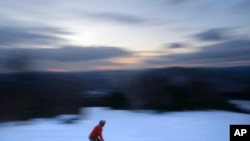A new study finds that U.S. ski resorts lost $5 billion due to man-made climate change between 2000 and 2019 and could lose about $1 billion annually by the 2050s, depending on emissions reductions.
People “might not care about species disappearing on the other side of the planet, or flooding happening in other parts of the world. But sport is often the thing that people care about,” said Daniel Scott, a scientist at the University of Waterloo and study co-author. “They can see some of these changes happening.”
Warm weather has upended winter recreation in North America and Europe this year, with Maine canceling a 402-kilometer dog sled race, Minnesota opening golf courses and Austria’s ski races needing last year’s saved snow. Scientists say a warm, dry El Niño weather pattern combined with global warming is to blame and has brought the threat of winter into the spotlight.
“This is a question of now, not a question of the future,” said Auden Schendler, senior vice president of sustainability at Aspen One, the ski and hotel company that funded the study, which was published in Current Issues in the Tourism Industry.
It simulates the average ski season in the absence of climate change in four major U.S. markets (Northeast, Midwest, Rockies, and Pacific West) from 2000 to 2019. Its baseline comparison is the 1960 to 1979 ski seasons—a period when most ski resorts were operating and before significant trends in anthropogenic warming began. The study found that even with artificial snowmaking to make up for the reduction in natural snowfall, the average season was shortened by 5.5 to 7.1 days between 2000 and 2019.
Under an optimistic emissions reduction scenario, even with snowmaking, the future of the U.S. ski industry will be 14 to 33 days shorter in the 2050s. The high emissions scenario would almost double the number of days lost.
Countries participating in annual climate talks agreed in December that the world needs to “wean away” fossil fuels that are heating the planet to dangerous levels, but did not set specific targets to do so. Last year the Earth experienced its hottest year on record, and this year the monthly records continue.
“If you care, the future of the ski industry is really in our hands and it will be played out over the next 10 to 15 years through the policies and actions we take to reduce emissions,” Scott said.
Researchers calculated economic losses based on increased snowmaking operating costs and lost skier income. Scott called the estimates “probably conservative,” noting they don’t include things like lost money spent by skiers on goods and services in the winter sports community.
The researchers said they conducted the study in part to fill a gap in good data on how much climate change is costing the ski industry. They also said the data is needed if the industry files lawsuits against fossil fuel producers, citing as precedent ongoing lawsuits by several Colorado communities that are suing oil companies ExxonMobil and Suncor Energy. Demand payment for the costs of adapting to the impacts of climate change.
Snowmaking “can no longer fully offset ongoing climate change,” the researchers wrote, adding that “the era of peak ski season may be over in most U.S. markets.”
That sentiment was echoed by Rutgers University researcher and New Jersey climatologist David Robinson, who called the study interesting and reliable.
“The snow isn’t going to stop,” said Robinson, who was not involved in the effort. But as the planet continues to warm, “things like snowmaking can only go so far.”
Julienne Stroeve, a senior scientist at the National Snow and Ice Data Center who also was not involved in the work, said the study does not address how skiers and snowboarders respond to reduced snow quality. She wondered whether skier behavior would change if bad snow conditions became more frequent.
This change in skier behavior is called substitutability, Scott said. Will people go to other ski areas if skiing isn’t an option or doesn’t offer good snow conditions? Switching to mountain biking? Scott said he wants answers.
“That’s another thing we want to know more about, because then you can improve your modeling,” he said.
Follow us on Google news ,Twitter , and Join Whatsapp Group of thelocalreport.in
